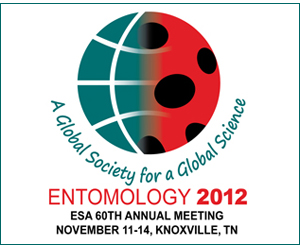North Central Branch Annual Meeting Online Program
Larval food stress influences adult immunity in Aedes aegypti
For insects, physiological stress experienced in juvenile stages produces negative effects on life history that carry over into the adult phase. Container-breeding Aedes mosquitoes are an excellent system for investigating such effects, because larvae develop in a discrete environment where detritus input to containers determines nutrient content and, with density, determines per capita food availability. Nutrient stress is common in container systems, and is known to prolong larval development, increase mortality, and reduce adult size, fecundity, and longevity. Previous studies also suggest that food-stressed Aedes may be more susceptible than non-stressed individuals to arboviral infection, with a higher proportion of stressed individuals becoming physiologically competent vectors of disease. I postulated that the mechanism by which this occurs is the existence of trade-offs between larval development and adult immune function due to physiological stress associated with density-dependent food reduction. When mosquito larvae raised at multiple experimental densities were challenged with mixed bacterial inoculation, cecropin A (a broad-spectrum antimicrobial and anti-parasitic peptide) transcription was greater in density-stressed than in non-stressed adults (P<0.006), suggesting a compensatory immune response in stressed individuals. Those results lead to testing the relationship between rearing density and susceptibility to infection with the parasitic nematode Brugia pahangi, focusing on potential correlations between transcription of immune-related genes and other physiological variables related to infection susceptibility. We hypothesize that increased transcription of immune-related genes in food-stressed individuals will be associated with increased nematode infection susceptibility.
See more of: Student Competition Poster


